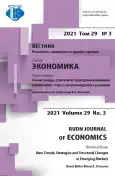What’s happening to the locomotive of global economy, or The myths about the recovery of China
- Autores: Reshetnikova M.S.1, Pugacheva I.A.1
-
Afiliações:
- Peoples’ Friendship University of Russia (RUDN University)
- Edição: Volume 29, Nº 3 (2021): New trends, strategies and structural changes in emerging markets
- Páginas: 575-586
- Seção: Developed and developing countries economy
- URL: https://journal-vniispk.ru/2313-2329/article/view/324213
- DOI: https://doi.org/10.22363/2313-2329-2021-29-3-575-586
- ID: 324213
Citar
Texto integral
Resumo
The COVID-19 pandemic has caused irreparable damage to all economies. Coping with the consequences by the leading players in the global economy is only expected. However, the world’s leading organizations have been trumpeting about overcoming the crisis in China. The aim of the research is to analyze the current state of the Chinese economy and answer the question whether it has overcome all the crisis phenomena. As part of the study, the authors analyzed indicators such as GDP, debt level, level of domestic demand, activity in the financial market and the M&A market, as well as technological and social policies of China and the structure of trade. For the analysis of quantitative indicators, a combination of comparison and classification methods, media scanning, and crowdsourcing was used. The information base was grounded on annual reference books published by official institutions in Сhina, World Bank, International Monetary Fund, statistical data from international publications devoted to Chinese economy. The analysis showed the presence of trigger situations in the stock market, in the market for innovative investments and the banking sector. The state of the credit system is also a matter of concern. The authors have proven that enthusiastic statements about the rapid recovery of the Chinese economy are more an encouraging myth than a fait accompli. Today, China is only at the beginning of its recovery from the crisis caused by the pandemic. Will it be able to become the locomotive of global economic growth again, as in 2008? The answer to this question remains open.
Palavras-chave
Sobre autores
Marina Reshetnikova
Peoples’ Friendship University of Russia (RUDN University)
Autor responsável pela correspondência
Email: reshetnikova-ms@rudn.ru
PhD, Associate Professor of Economic and Mathematic Modelling Department, Economic Faculty
6 Miklukho-Maklaya St, Moscow, 117198, Russian FederationIrina Pugacheva
Peoples’ Friendship University of Russia (RUDN University)
Email: 1032196331@rudn.ru
master graduate, Economic and Mathematic Modelling Department, Economic Faculty
6 Miklukho-Maklaya St, Moscow, 117198, Russian FederationBibliografia
- Chen, X. (2017). Reducing contribution rate, Pension Fund revenue and Pension Fund balancing in long term. Chinese Journal of Population Science, (3), 55-69. (In Chinese)
- Dong, K., & Park, D. (2019). Reforming pension insurance in the People’s Republic of China. Asian Development Bank
- Dong, K., & Wang, G. (2016). China’s pension system: Achievements, challenges and future developments. Economic and Political Studies, 4(4), 414-433
- Reshetnikova, M. (2020). Venture capital market in China: A new approach to innovation management. Utopía y Praxis Latinoamericana: Revista Internacional de Filosofía Iberoamericana y Teoría Social, (5), 252-264
Arquivos suplementares









